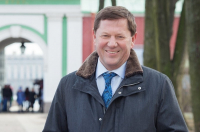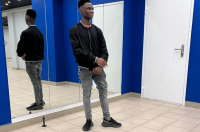Kirill Artemenko: The topic of today’s interview is “The Future of Education”. How do universities today see freedom of choice in education? How do you balance between the students’ desire to learn specific, in-depth subjects and the need to adhere to government standards?
Daria Kozlova: I think the truly modern and trendy universities today are ones that are quick to readjust to new goals. Universities need to look ahead and change their educational programs and tracks in a timely manner. As for accreditation and educational standards, I’ll note that we, as in the university, believe that government accreditation should depend on a university’s type. If it’s a progressive university, a sort of educational trendsetter, it can’t be measured by common KPIs. Unlike, say, universities that exist to facilitate regional development. Those are different cases and they need different strategies.
ITMO University’s strategy is focused on students and the need for dynamic change. That’s the framework we function in. These changes concern both the university’s inner structure and its environment in general. At first, I had thought that we’ll eventually find some appropriate model and stop there. But today I understand that we can’t stop; everything around us is changing so fast, and the university needs to reflect that. That’s why our educational programs, technologies, curricula are constantly changing, as it’s the only way to give students what they need.

Are you able to keep up with the pace of the changes?
We are a small university, and that lets us implement whatever we need very fast. For example, right now we understand that informational technologies should be used in urban science and in finance. So, we put together the right experts from Russia or abroad and partner up with the leading organizations in those fields. That’s our way of quickly reacting to changes in the world.
ITMO University began to develop dynamically in 2014 when it joined the 5-100 Russian Academic Excellence Project. Which international practices did you focus on at first? What is the situation in regards to the adoption of international experience at Russian universities?
We looked at different universities for different aspects of our development. There is no one university that you can just replicate, slap a new name on it and put it to work. In regards to research and entrepreneurship, we took examples from MIT. We have more Master’s degree students than Bachelor’s and PhD students, and we are creating an environment at the university in which students can become entrepreneurs.
As for educational technologies, we looked at other universities. Right now, we’re rethinking our educational paradigm and thinking of ways to make the educational process more fitting for today’s students. We take inspiration from Singapore, a number of American universities and the Netherlands.
Why Singapore?
Singapore has two leading universities: the National University of Singapore and Nanyang Technological University, which has become one of the world’s top universities in the past couple decades. Both universities have some of the best systems for attracting international students and staff.

Modern education leans towards freedom of choice of each student’s educational track. But imagine that you’re given a choice between taking a regular math course that gets you 3 credits or a more complex subject, like, say, math with advanced programming elements. It’s clear to a student that if they want to graduate with top marks, they should go with the former. The most interesting aspect of the Singaporean model is this: they’ve eliminated exams for first-year students so as to get them used to the idea of choosing subjects, and not necessarily the easiest ones. This way, they create an educational track they’re interested in and care less about fulfilling some formal requirement.
As for the European experience, it’s worth noting that Russia still doesn’t have a strong social group of students or graduates. A firm, cohesive alumni community is something we’ve yet to achieve. At ITMO, we want to give our graduates the opportunity to come back to the university at a later point and take a course or several.
We’ve also experienced this issue when working on Paperpaper’s website for students: they identify themselves with many things, but never with being a student. Where does this issue stem from? Do you think you can solve it?
Identification with one’s alma mater, creating alumni communities, being proud of your university and harboring an attachment to it is something that’s fairly new to Russian universities. There was never a culture of university-alumni interaction; students would graduate and be forgotten. Today, we’re putting more effort into working with our graduates because we realize what an enormous resource they are. Many of our past graduates now teach our students.
How do you go about creating the university’s brand?

ITMO University was among the first to develop its own brand, to position itself and speak openly about research, all to erase the boundaries between the academic and non-academic world and learn how to talk about science in a way that’s easy to understand. In the beginning, our main principle was “from external changes to internal”.
What does that mean?
We underwent a change in visuals with a new name, new logo, and a new slogan, which came from a student. Then we went further by joining Project 5-100, meaning that our goal was now to not just compete with universities in St. Petersburg and Moscow, but to make a name for ourselves on the global market. At first, there was plenty of resistance to these changes, and that’s where a good administration is crucial: we spent a lot of time explaining why these changes were necessary. People came to terms with it and, I would say, a year later most of the staff identified themselves with the new brand.
The university’s values were a topic of discussion at numerous sessions with the academic staff and the students. We looked for inspiration by analyzing what other universities around the world offered. At first we had these very general objectives, but in a few years we understood that we had to rethink our mission and make it more expansive and yet specific. For instance, we identified such a vital category as academic freedom.

We also emphasized the respect for the individual as one of our values. What that means is a lack of hierarchy between staff and students. Every person at the university is, first and foremost, an individual with their own interests and opinions. The most important value of all is love. It’s a term that is often hard to describe to our international partners. For them, love is something to do with inspiration. What we mean is love for one’s university, for research and work that’s done with joy and not out of obligation.
We at Paperpaper.ru worked with JetBrains on a story about Project 5-100. We spoke to representatives of Russian universities, and many of them pointed out that it would be great to have some assessment of graduates’ competence as one of the project’s efficiency criteria. But nobody knows how to go about measuring that. Have you considered anything in that vein? How would you measure the competency of your graduates?
We’ve considered this, and we’ve also looked into measuring a university’s effectiveness from the point of view of its graduates. You’d have to very carefully track each graduate’s career and stay in touch with them. At MIT, for instance, they don’t talk about how 98% of their graduates work in the field of their major. They just say “Our graduates account for 2% of the US GDP, here are their names”.
In other countries, students tend to enroll in university later than they do in Russia. Here, 17 year-olds choose a university of their parents’ liking or for some other reason, but many end up confused as to what kind of jobs will be available to them, or whether they’ll enjoy it. How do universities solve this issue?

The system itself helps fight it: if you’re studying something you don’t enjoy or can’t handle, you can always switch your track. We’ve rehauled our educational process and students can now relatively easily transfer between programs.
Each student, in essence, has a personal transcript that says that, for example, they studied one program in the first semester and another in their second. This gives Bachelor’s students an opportunity to find their way in the first two years. Besides, we’ve made intrauniversity mobility obligatory, meaning that in their first two years, all bachelor students must acquire 6 credits from subjects outside their major. For instance, if you’re an IT student, you might end up taking some chemistry or economics. This is so that the students can understand where they like to be and what they’re good at, and, perhaps, find topics for interdisciplinary research.
Besides, right now admissions are quite strict due to the high minimum Unified State Exam (USE) scores. At the same time, we’ve realized that there are plenty of talented kids out there who share our values but may not have the right USE score. The ITMO.STARS program that we’ve launched this year helps those who have already created an app, invented something or completed some research.

David Yang, the founder of ABBYY, recently spoke at an open interview in St. Petersburg and described a system that his company is developing. It analyzes corporate correspondence to identify employees who are becoming less motivated and experiencing burnout. In my opinion, it’s a slightly terrifying, technocratic approach that doesn’t include a humanities aspect. Do you think it necessary to teach students humanities subjects in order to develop their emotional intelligence?
Thanks to the recent transformation of our educational programs, 10% of a student’s training has to do with their soft skills. Emotional intelligence is but one subject out of numerous courses that develop students’ communication and presentation skills, their ability to work in teams, deal with conflicts, and so on. This is not a new trend, but I believe that universities haven’t been paying much attention to it before and most of this stuff was extracurricular. Starting this September, these subjects are a mandatory part of every educational program.
Campus is an educational festival organized by the online news media Paperpaper.ru. As per the event’s concept, young scientists host open lectures at informal urban spaces. This year’s Campus was held in the format of open interviews. On July 1, 30 invited speakers, including scientists from ITMO University, participated in these interviews at various venues in St. Petersburg.





